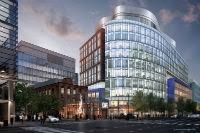 |
| Alexandria Real Estate's planned facility in Cambridge, MA (click to expand) |
Bristol-Myers Squibb's ($BMY) latest R&D reshuffle calls for a consolidated presence in Cambridge, MA's booming Kendall Square, and the drugmaker has signed on to serve as anchor tenant in the area's next big research facility, joining Big Pharma's ongoing colonization of a biotech hotbed.
Alexandria Real Estate ($ARE), a magnate in biotech property, is building a 431,500-square-foot outpost of lab and office space in Cambridge's biotech cluster, and Bristol-Myers has inked a 15-year lease on nearly half of the building. The location, slated to open in late 2017, is within reach of world-class research institutions including MIT and Harvard, plus a fast-growing group of biopharma companies large and small, seeded by the area's lively venture capital scene.
Bristol-Myers plans to locate about 300 researchers at the new shop, with a particular focus on genetically defined diseases, molecular discovery technologies and discovery platform chemistry. The Cambridge move means shuttering a pair of research outposts in Waltham, MA, and Wallingford, CT, the company said, and the overall restructuring will spell about 100 layoffs as Bristol-Myers ends its early-stage work in virology.
In fleeing the stilted suburbs for downtown Cambridge, Bristol-Myers joins a bustling group of drugmakers looking to the city's storied biotech ecosystem to jump-start their R&D efforts and find some innovative partners. Over the past few years, Novartis ($NVS), Pfizer ($PFE), Sanofi ($SNY) and many more have bought into the idea of abandoning far-flung R&D campuses in favor of rubbing elbows with the Kendall Square locals, cutting the ribbon on similar innovation centers in search of valuable ideas. Most recently, Eli Lilly ($LLY) and Baxter's ($BAX) soon-to-spin-out Baxalta have piled onto the scene, blueprinting R&D hubs of their own.
But Cambridge's ongoing status as biotech's it-neighborhood could be at risk of cannibalizing what makes the area so desirable in the first place, some warn. As Unum Therapeutics CEO Chuck Wilson outlined in a blog post last month, the surge in demand for Cambridge lab space is driving rent prices ever higher, and while that's no trouble for the likes of Bristol-Myers and Pfizer, $80 per square foot can be cost-prohibitive for penny-pinching startups. Left unchecked, Big Pharma's appetite for Cambridge addresses could price out the early-stage innovators that make the neighborhood so attractive, according to Wilson.
But Alexandria, which has major holdings in all of biotech's hotbeds, isn't worried about that. At last week's BIO conference in Philadelphia, CEO Joel Marcus pointed out that the industry's recent boom has injected cash into every tier of biopharma. Series A rounds are reaching new heights for biotech upstarts, he said, and the most promising new companies are more than able to afford to stick around in Cambridge.
"The startups today are being way more well funded. They have better trajectories. They've got longer cash runways," Marcus said. "And rent is not a major factor in their overall cost and operations. They don't want to be gouged, and they don't want to pay something that's not fair, but as a cost of doing business, it's not material."
- read the statement